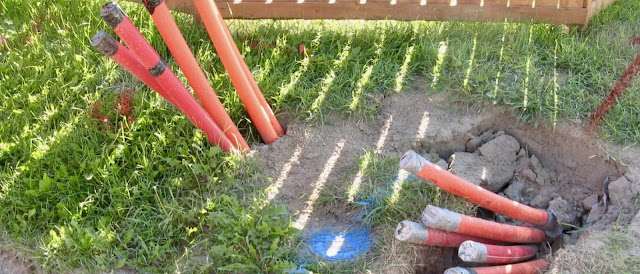How Can I Extend the Lifespan of Conduit Pipes in Wire Installation Projects?
When it comes to wire installation projects, the choice of conduit pipes plays a crucial role in ensuring longevity and safety. Conduit pipes are the unsung heroes that protect and preserve your wires, safeguarding them from external elements and potential damage. For those engaged in boring pipe conduit wire installation, the need for durability and longevity becomes even more apparent.
So, here, in this blog, we will explore essential tips and techniques to extend the lifespan of conduit pipes in such projects.
Whether you are a seasoned professional or a DIY enthusiast, understanding how to maximize the life of your conduit pipes is vital. We'll delve into various aspects, from material selection to maintenance practices, all while emphasizing the importance of "boring pipe conduit wire installation" throughout the discussion.
Extending the Lifespan of Conduit Pipes in Boring Pipe Conduit Wire Installation
Choosing the Right Conduit Material
Selecting the appropriate conduit material is the first step in ensuring a long lifespan for your wire installation. When it comes to boring pipe conduit wire installation, you have several options, including PVC, metal, and HDPE (High-Density Polyethylene). Each material has its own set of advantages and considerations.
PVC Conduit: PVC conduit pipes are a popular choice due to their affordability, corrosion resistance, and ease of installation. When properly installed, PVC conduit can last for decades in underground or above-ground applications.
Metal Conduit: Metal conduit, such as galvanized steel or aluminium, is known for its strength and durability. It is particularly suitable for projects that require protection against physical damage or extreme environmental conditions.
HDPE Conduit: HDPE conduit is a versatile choice, resistant to chemicals, moisture, and temperature variations. It is ideal for boring pipe conduit wire installation, offering excellent protection against soil-related challenges.
By carefully considering the specific requirements of your project, you can choose the conduit material that best suits your needs and helps extend the lifespan of your wire installation.
Proper Installation Techniques
The manner in which conduit pipes are installed greatly affects their longevity. For boring pipe conduit wire installation, it's crucial to follow these guidelines:
Adequate Depth: It's crucial to bury the conduit at the correct depth, typically determined by local building codes. This depth protects it from external forces like accidental digging or vehicular traffic, and it also shields it from temperature fluctuations and soil moisture levels, ensuring the conduit's longevity and wire safety.
Smooth Boring Process: Employing efficient boring techniques is essential during installation. By minimizing friction and stress on the conduit, you prevent unnecessary wear and tear, ultimately prolonging its lifespan and maintaining the integrity of your wire installation.
Secure Supports: Install secure supports and hangers at regular intervals along the conduit's path. These supports prevent sagging or deformation over time, ensuring that the conduit maintains its shape and structural integrity, even under external pressure or weight.
Lubrication: The application of a suitable lubricant while pulling wires through the conduit is a crucial step. Lubrication minimizes friction, reducing the risk of wire damage and preserving the conduit's interior surface, preventing wear and tear that could lead to costly repairs.
Proper Sealing: Seal conduit joints and entry points diligently to keep moisture at bay. Moisture infiltration can lead to corrosion, which compromises the conduit's structural integrity and can damage the wires within. A tight seal ensures that your conduit remains moisture-free and corrosion-resistant for years to come.
By adhering to these installation practices, you can significantly enhance the durability of your conduit pipes, ensuring they withstand the test of time in boring pipe conduit wire installation projects.
Regular Maintenance and Inspection
To extend the lifespan of conduit pipes, ongoing maintenance and inspection are essential. Here are some key steps to follow:
Visual Inspection: Periodically inspect the conduit system for signs of damage, such as cracks, dents, or corrosion.
Cleanliness: Keep the conduit pathway free of debris and contaminants to prevent clogs and potential damage to wires.
Repairs: Promptly address any issues identified during inspections, replacing damaged sections or applying suitable repairs.
Re-Sealing: Reapply sealants and waterproofing measures as needed to maintain the integrity of conduit joints and entry points.
Grounding: Ensure that the conduit system is properly grounded to prevent electrical issues and potential damage.
By incorporating routine maintenance and inspection into your wire installation projects, you can detect and address problems early, effectively prolonging the lifespan of your conduit pipes.
The Concluding Notes
In the world of boring pipe conduit wire installation, the longevity of conduit pipes is of paramount importance. Choosing the right conduit material, following proper installation techniques, and implementing regular maintenance practices are the keys to ensuring that your conduit pipes withstand the test of time.
By keeping the keyword "boring pipe conduit wire installation" in mind throughout your project and incorporating these tips, you can extend the lifespan of your conduit pipes and, in turn, provide greater protection for your valuable wires. Whether you are a professional or a DIY enthusiast, these strategies will help you achieve a successful and long-lasting wire installation.
Investing in the durability of your conduit pipes not only enhances the safety and reliability of your electrical systems but also saves you time and money on future replacements. So, remember these tips and make the most of your conduit pipe wire installation projects.



.jpg)
.jpg)


Comments
Post a Comment